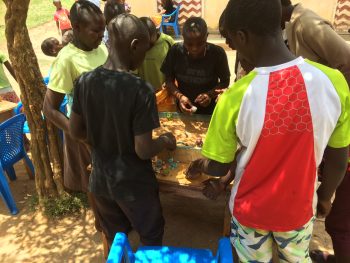
Written by Ian Mc Cabe
During lunch in the orphanage in Kabale, Uganda, a colleague asked the Manageress, Kedrace , “How did Ian get to connect with you”. The question brought me back to a Saturday night three years previously. I was attending a fund raising dinner for children in Africa. While the host was speaking about the tremendous work they were doing in Uganda, my attention was entirely focused on the remaining three chocolate mousses on the serving table – I looked around to check if everyone had finished theirs and decided to make a quick beeline, grab one and swiftly retreat. However, as I approached the chocolate mousse, I heard the speaker say in an anguished voice, “ Today, I had to make one of the most difficult decisions of my life” – Now, I was grabbed by that and could sense he was pained and listened. He explained, “ I decided to withdraw funding from an orphanage we have been supporting in Uganda”. I returned to the table sans mousse and looked at my wife, “Did you hear that?” She enveloped my hand and said “not your business”. That soothing hand usually works in the supermarket when I see a child being harshly chastised by a distraught mother and look to my wife. When the speaker left the podium I approached him and for some reason, without any explanation, just asked him for the phone number of the orphanage. Somewhat startled the fundraiser looked in his phone and gave me the number. I thanked him and again offered no explanation. The next morning, I rang the orphanage and for the first and last time was answered immediately. It was a poor connection but sufficient enough to exchange email addresses with the manageress, Kedrace.
After donating to the Orphanage for two years, I decided to accept the invitation to visit at Christmas. The journey to Kabale in Uganda requires a stop in Kigali in Rwanda. However, when I arrived at the airport I was told that only British people not Irish could get a visa on arrival in Rwanda. He told me matter of factly that there was no way he would give me a boarding card. I had two heavy suitcases of figurines and presents for the children. He said that I should simply go home and apply for a visa online which takes 48 -72 hours.
I had arranged to meet Professor Mikyung Jang, President of the Korean Society of Sandplay in Uganda where we would give a presentation on sandplay to 24 project workers. They and the orphanage were expecting me.
The flight was due to leave in one hour. I asked for the manager, then the manager’s manager. Security was now hovering around – this was a trigger to calm down. In that moment of clarity I accepted this was my own mistake for not having clarified the visa rules. Finally, I asked if I were in transit to Uganda from Rwanda would they allow me to board the flight to Rwanda. The answer was, yes, if I had a valid transit ticket. I went to a kiosk where they sell last minute tickets and was offered a ticket for onward flight from Kigali in Rwanda to Entebbe in Uganda for £350, or I could take a risk and pay £100 for a connecting flight that most probably, if not definitely I was too late to connect to. Much to the amazement of the ticket seller I chose the £100 ticket figuring once I got into Rwanda I would talk my way in. Eventually, I arrived in Kigali – after two hours of talking sweetly to Rwandan “homeland security” they eventually gave me a 72 hour transit visa. (Two weeks later the rules were changed so anyone travelling from the UK can get a visa at the port of entry in Rwanda).
While in Kigali, I visited the Memorial to the million Tutsi who had been massacred just 25 years previously. The memorial is the burial ground to a quarter of a million Tutsi men, women, and children. The Hutus were caught up in a frenzy of attacks against their neighbours, ”the other”, upon whom they projected their misfortunes. I looked at people around me and felt a profound sense that the veneer of civilisation is very thin – everywhere!
The manageress from the orphanage, Kedrace, came in a four hour taxi ride from Kabale to Kigali to escort me through a “no man’s land” entry point between Kabale and Kigali. Pleased to say my Irish passport proved a blessing and I was allowed into Uganda without any fee for the entry visa.
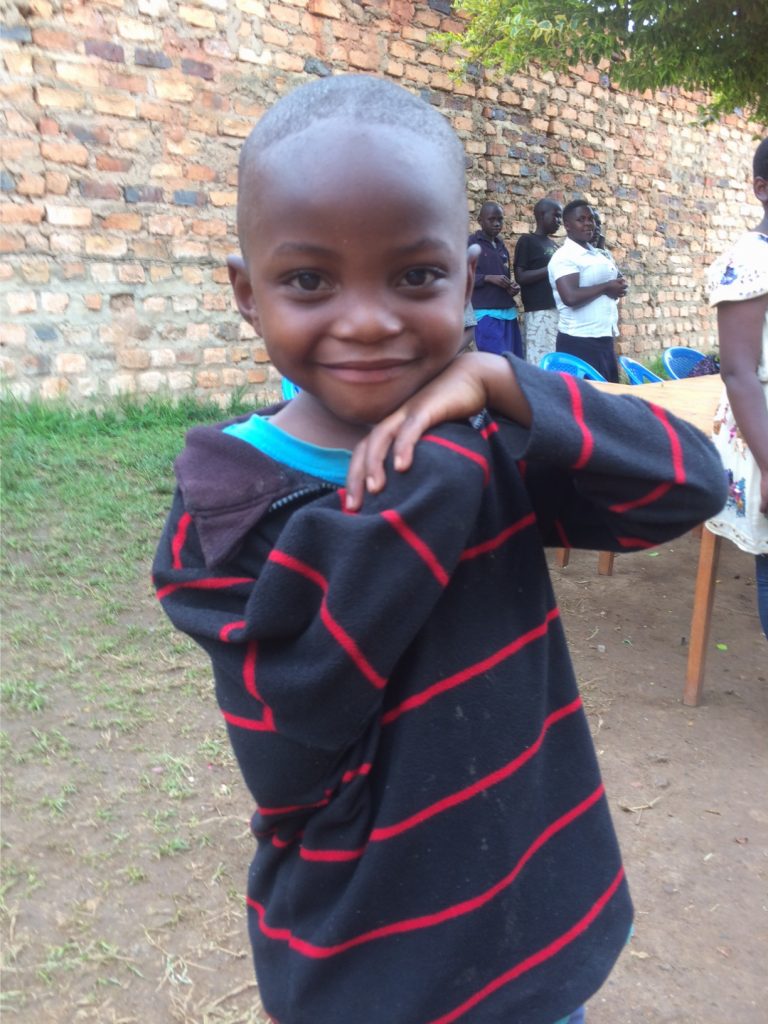
The orphanage houses children aged from 2 years to 16 years of age there. The orphanage also feeds about another twenty children. It is basically a three bedroom bungalow. On my first visit to the orphanage there were foam mattresses on the floor. Cooking of the mainstay food – porridge, is done in the yard. There was one dim light in the main front room that holds 25-30 children when it is raining. There were no books and the only toy was a CD disc nailed to a stick that was wheeled around mechanically by a very depressed boy, Mark, who was two years old. His mother gave birth to him when she was 15 and returned to live on the streets sniffing glue and eating scraps from dumpsters. This Christmas, I met Mark and attach a photo that speaks for itself.
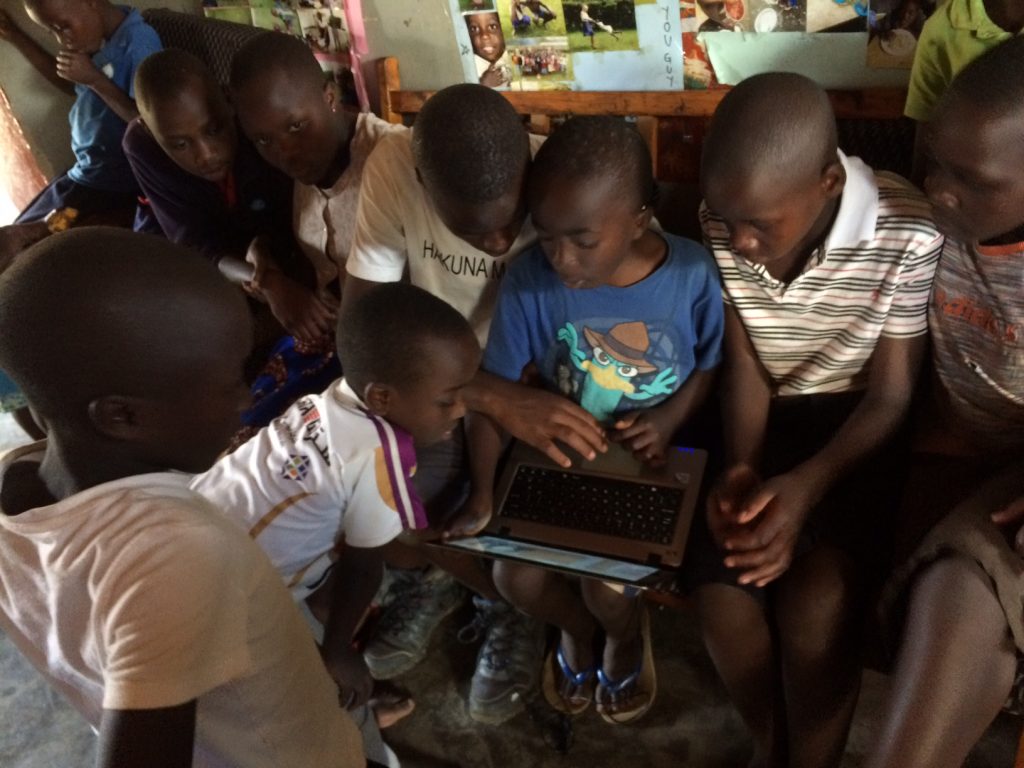
While there, it was agreed that funding would be raised for bunk beds, a satellite dish television, a drum and piano keyboard would be purchased. We realised that more had to be done, such as minor repairs to the broken toilet bowl. The children’s diet needed improvement from the monotonous three- times-a-day local porridge. I left my laptop down and within minutes several children surrounded it and were eagerly engrossed in watching a Dora Kalff video on sandplay. Thanks to generous donations from colleagues the above has been accomplished and they now have 3 computers, 2 iPads and an iPhone.
During individual sandplay sessions, the children spoke of their time as abandoned street children. Some would live on a hill overlooking the town. At the bottom of the hill an elderly woman struggles to make a living selling fried chips. She peels potatoes all day long. At night, the children emerge from the hill and scavenge around for the potato peelings left behind. One young 13 year old girl spoke of scavenging in dumpsters and that the worst part was competing with the rats who would bite her feet. She also spoke of a beating by the police and being chased by a group of street children who wanted to rape her. Sexual abuse of street children is endemic and I heard of one young boy of ten being sexually abused while he was sleeping in an alley by three women. Unfortunately, given the trauma of sexual abuse to be re-enacted, care must be taken when bringing older boys into the orphanage.
Simultaneous-group-sandplay facilitated by Mikyung Jang and myself revealed remarkably similar archetypal images. Both groups identified Kedrace as the fairy queen. The umbrella was their protectorate home and a heart figurine was placed under the umbrella. The enthusiasm amongst the teenagers was such that when I withdrew as facilitator, eight of the adolescents silently, though with great solemnity, spent half an hour rearranging the figurines in the sandtray to speak their joint story. My feeling was that, that was where the healing began. My experience of teenagers in Ireland is that they won’t engage with the sand tray believing that it is for children. I usually ask them to try moulding the sand and this yields results, for example with one teenager sculpting the sand to read SOS.
While having lunch I was told about a highly gifted young boy who was brought to the orphanage by his father who was in his early thirties and dying of an AIDS related illness. His last request was that his son should be taken care of. The son progressed extremely well at school. Three months later when he died his son ran away from the orphanage and took to glue sniffing on the streets. I was told he was getting nervous living on the streets since he found the body of a friend of his in a black plastic bag after he had been harvested for body parts. This was too horrifying for me to take in and I hoped it was just a “story”. By a coincidence when driving through the town, Kedrace casually pointed out a boy in oil drenched torn rags, holding a large potato sack cloth bag who was on pavement staring blankly into space. She said, “There is the boy I was talking about”. I asked the car to stop and with Kedrace approached the boy. First I bought a loaf of bread and gave it to him – he first shared it with his friend and then began to devour it. I asked Kedrace if she could take him back into the orphanage and she explained there was absolutely no more room. She further explained that in order to rehabilitate him, he would need expensive residential secondary education; As at the Rwanda air ticket desk, I couldn’t take no for an answer and Kedrace was eventually persuaded. I asked the boy if he would like to go into the clothes shop to get fitted out. He asked if his friend could come too. While in the shop, he chose the best Nike runners and my heart dropped as I had remembered that some fashionable Nike runners could cost thousands of dollars. I nodded my approval to everything he wanted. The assistant measured him up and suited him out in shirt and trousers. I was surprised to see middle class Ugandan women, who were shopping, literally raise their noses in the air in a condescending manner. Finally the bill for him and his friend, I breathed in expecting at least 1000 dollars and at first it sounded like that, 300,000 Ugandan shillings which turned out to be about £70. The young boy wouldn’t leave his sack of scrap metal parts behind until he was persuaded to give them to his friend. A year later he is progressing and attached is a picture of him (which is displayed with the approval of the Manageress of the orphanage).
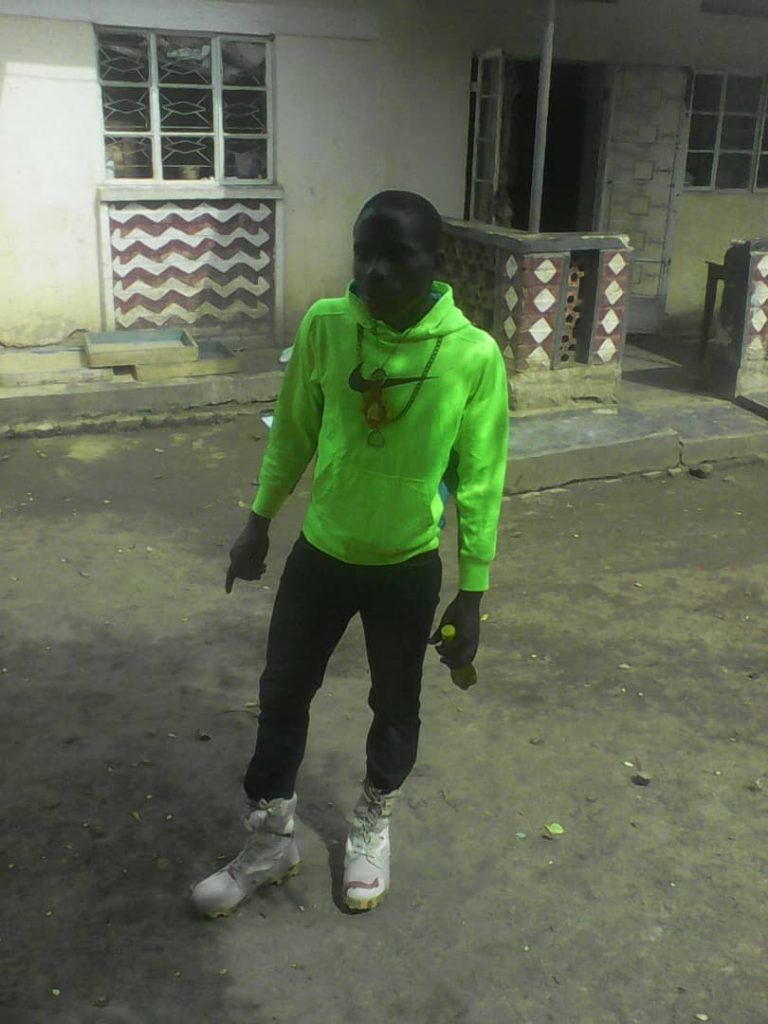
While there I took a boat trip to the Pygmy Island and given that there is now interbreeding the height difference is not so prominent. However, I passed by Punishment Island where young pregnant teenage girls were deposited by their families to die of starvation. This punishment continued until 1965. It reminded me of the Magdalene laundries in Ireland where pregnant young women gave birth and were imprisoned to work there for the remainder of their lives. Perhaps many primitive societies have their way of placing their sexual shadow onto innocent victims. Notably there was a single barren tree on this small marshy island and on it were heron birds, waiting patiently, like vultures as though having inherited an intergenerational instinct about the easy pickings from pregnant dead girls that might become available: A harrowing sight.
The presentation of sandplay by Professor Mikyung Jang in Kabale was a huge success. While there were twenty four participants, representing several local charities each group received one or two sandtrays along with figurines. There was a great demand for further training. Given that approximately 1 million people die from alcohol related diseases each year out of a population of 43 million, I presented the idea that a training course entitled “Introduction to Addiction Counselling Skills” would be appropriate. I was surprised by the huge thirst for knowledge on this topic. It was agreed that following a weekend introductory course a one-day a week course each Sunday for 15 weeks would be arranged. Three lecturers were recruited. Following the weekend course, 30 people signed up. I coordinated with the Martyrs University in Kabale and the course was held there. After the first week, a further 40 people applied and 30 were accepted so we now had 60 participants. Fifty-eight of the 60 participants showed up for the graduation ceremony. Best of all, the guest of honour, Fr Abel, the Director of Programs at the University agreed to take over the course and offer a university certificate to all future participants. Additionally, twelve of the participants asked for further sandplay instruction and a three day course was facilitated by Professor Mikyung Jang.
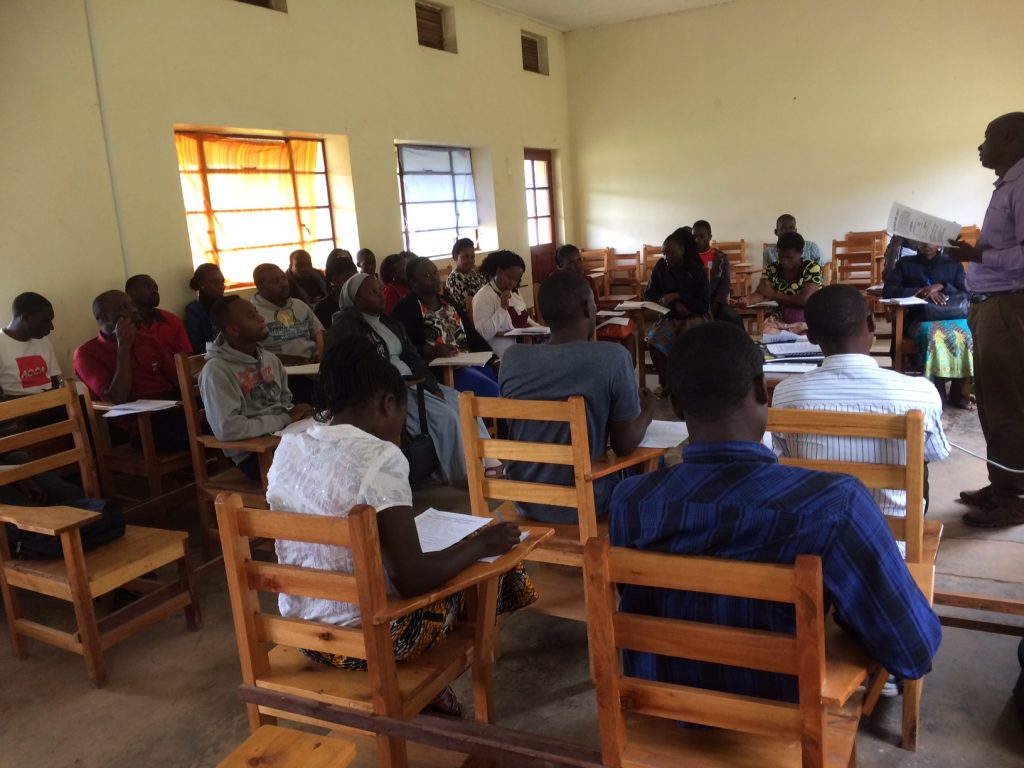
Any
hiccups? Yes during one to one sandplay sessions we learned that the television
was not being turned on in the orphanage. Similarly the lights we had bought
were not being turned on. This is
because the manageress has to prioritise and spending £15 on a monthly
electricity bill could be curtailed by not putting the light or the television on.
We realised that since the orphanage now had computers and an iPad that this
economy was hurting the development of the children, so it was agreed that the
electricity bill would now be funded.
O yes, in answer to the question at the beginning how did I connect with
Kedrace, she answered as follows – “ One Saturday, I hear the rent is not going
to be paid. I cry all day and all night,
finally at midnight I say to God , God these are your children , you must care
for them , I hand them over to you. Then I felt a great peace and I went to bed
and slept soundly. Next morning the phone rang and it was Ian – I said thank
you God!”







